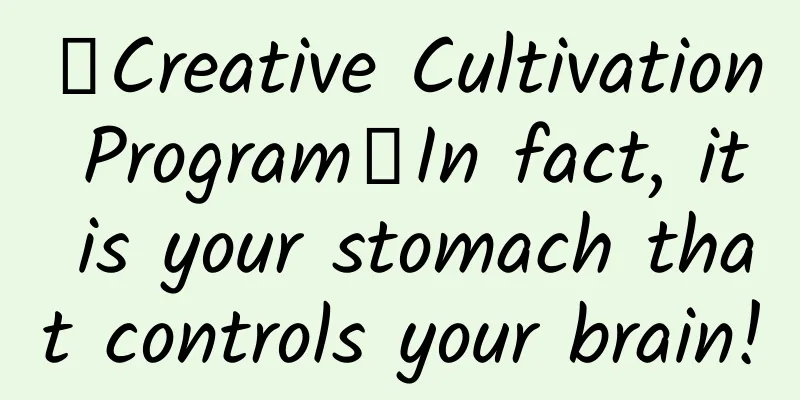【Creative Cultivation Program】In fact, it is your stomach that controls your brain!

|
Author: Chen Wen Reviewer: Associate Professor Tao Ning, Institute of Biophysics, Chinese Academy of Sciences Beer, barbecue, peanuts, edamame, these are the only good things in summer. However, sometimes, we may get upset if we are not careful. At this time, in addition to not eating random foods to regulate the stomach, the intestinal flora in our body will also control the immune system and help us recover as soon as possible. In addition to playing an important role in digestion, regulating human immune function, resisting disease, and producing essential vitamins for the human body, intestinal microorganisms surprisingly also quietly control and reflect our emotions. Think about it, when you eat something delicious, do you feel happy? When you are in a bad mood, you will want to eat something delicious to relieve your sadness. At the same time, your emotions will also be reflected in your gastrointestinal tract - being nervous to the point of having diarrhea is not just a description, but something that really happens in life. So how does the gut affect our mood? The key lies in the pathway between the brain and the gut - the vagus nerve. The vagus nerve allows us to breathe, swallow, and digest food without having to think about it. This nerve connects our brain stem to our digestive organs, and these nerve fibers eventually embed into the lining of our digestive organs. This "highway" allows our brain and gut to "talk to each other." When gut bacteria break down food particles, they produce metabolites that the vagus nerve can sense. In turn, this nerve transmits this information to the brain, which regulates the digestive process. But stress shuts down the vagus nerve, preventing it from performing these important tasks. If the vagus nerve is unresponsive due to stress, it will not release anti-inflammatory molecules that can relieve inflammation. This explains why we have diarrhea when we are stressed. Today, the importance of the brain-gut axis in maintaining homeostasis is recognized and its impact on our emotions is being actively studied. Previously, researchers from Philadelphia conducted systematic experiments hoping to discover the impact of intestinal microbial communities on emotions and psychological susceptibility. The researchers divided the rats into two groups: a control group, which rested in their own territory, and a social conflict group, which was placed in the territory of another aggressive rat, where they would inevitably have a series of tense interactions. The researchers analyzed their fecal samples to compare changes in their intestinal microbial communities. After a period of repeated conflict, the rats in the social conflict group had higher levels of Bacillus and Clostridium, and lower levels of Bacteroidetes. Bacillus microbes contain a variety of anti-inflammatory substances, and an increase in Clostridium is also generally associated with inflammation, and their increase is a healthy response to stress validation. However, the rats in the social conflict group behaved differently—some faced the challenge confidently, while others lay flat and gave up. The levels of the two bacterial communities in these rats were also different—after several days of conflict, the confident rats had an increasing proportion of Bacillus and Clostridium, while the timid rats did not show any adaptive changes in the proportion of these communities. What happens to laboratory rats also happens to us humans. In an analysis of stool samples from patients with clinical depression, scientists found that compared with non-depressed patients, depressed patients had more Enterobacteriaceae and other microorganisms in their intestines, but fewer Faecalibacterium prausnitzii. Moreover, the less this Clostridium, the more severe the depressive symptoms. Now scientists are beginning to look for microbial connections to the brain that could lead to new treatments. Some doctors and drug companies are already exploring probiotics — oral bacterial supplements — for treating depression, though they are not usually included in the missing gut microbes found in the new study. Although our research and understanding of intestinal microorganisms are still in the early stages, it is undeniable that intestinal microorganisms play a role in our emotions. The intestines, as our "second brain", affect human health in a unique way. Next time you encounter something unhappy, eating something delicious may really make you feel better. https://baijiahao.baidu.com/s?id=1688944179424515269&wfr=spider&for=pc https://www.cas.cn/kj/201902/t20190211_4679410.shtml http://www.360doc.com/content/20/0927/07/66709766_937781966.shtml https://view.inews.qq.com/a/20220502A03QG900?startextras=0_cf218020391ee&from=amptj https://zhuanlan.zhihu.com/p/297673556 This article is produced by the Science Popularization China-Creation Cultivation Program. Please indicate the source when reprinting |
<<: What happens if you eat food that is one month past its expiration date?
Recommend
What are the characteristics of bird's nest appearance (the quality is more obvious in appearance)
...
Doctor, why do I need chemotherapy after surgery?
This is the 5041th article of Da Yi Xiao Hu The B...
Health risks for white-collar women
Many people want to be white-collar workers becau...
My child coughs a lot before going to bed. What’s going on?
From the beginning of autumn to the beginning of ...
Is it serious if I don't have my period for two months?
If you don't have your period for two months,...
I took anti-inflammatory injections for three consecutive days during my period.
Women's bodies are weaker during their menstr...
How long does it take for the menstrual period to end?
Women need to stay in confinement after giving bi...
How to store watermelon if you can’t finish it? How to keep watermelon overnight without a refrigerator?
In the dry and hot summer, eating a sweet and juic...
Belly distension after intercourse during ovulation
For women, any small problem in their reproductiv...
Why does the vulva turn black?
Some women may find that their vulva becomes dark...
What does female abdominal B-ultrasound check?
B-ultrasound is a medical examination method that...
eMarketer: Mobile phone penetration in Asia Pacific to increase significantly from 2011 to 2015
The latest data from eMarketer found that the mob...
Treatment for night vomiting during pregnancy
In our lives, we may often feel like vomiting at ...
How to get back in shape after having a baby
During pregnancy, we should pay attention to diet...
Use drugs rationally and avoid abuse
According to statistics, the incidence of drug ab...









